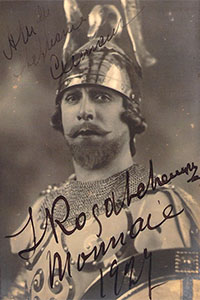The History of Joseph Rogatchewsky

Born: 1891
Died: 1985
Russian Tenor.
The Russian tenor born in 1891 was Joseph Rogatchewsky. Who you will not be surprised to learn, turns out to be one of those special lyric tenor, who we have discussed from time to time. And whose illustrious predecessors, such as Lipinski and Smirnov we’ve already heard.
However, this time there is a significant difference, because Rogatchewsky studied in Paris and was there all during the First World War.
When the war finally ended, he chose to stay there rather than returning to revolution torn Russia.
So that from a collector’s point of view, he has always been considered as a French tenor and that his career was spent mainly in France, and his gramophone records concentrated on the French operatic repertoire.
Let us now look at a short piece written on this artist by Clements Hauslayner.
In the history of culture, there are numerous examples of the close relationship between French and Russian art. In the field of song also, this phenomenon is frequently identified, and it is very significant that Puta Maritz, the inventor of the famous theory of types, includes the Russians and the French.
In one and the same category. The singer Joseph Rogatshewsky offers one of the most convincing arguments for this theory. A native of Russia, he became one of the greatest representatives of French opera. Even regarded by many as the most significant French tenor of his era.
De Mon Amie Fleur / Perl Fishers / 1928 – Joseph Rogatchewsky
Rogatchewsky was born in Myrhorod in 1891. His singing talent became apparent very early.
And at the age of 18, he came on a scholarship to Paris where he completed his studies at the Conservatory under the tuition of the singing teachers Hetif and Hisnaradon.
In the First World War he enlisted willingly in the French army and was wounded several times.
After the end of the war, he did not go back to Russia but began his artistic activity in France and Belgium.
His debut was in Toulouse in 1922 and the same year saw his first appearances at the Opera Comique.
In 1924 he sang at the Money in Brussels and became regarded there as their leading tenor.
He remained henceforth, bound up mainly with the opera comique and took part in numerous guest performances on that stage.
Great admiration was aroused above all, by his portrayals of Masni parts.
Here then is his lovely recording of the dream from Masnis Manon.
O Dolce Incanto / Manon / 1927 – Joseph Rogatchewsky
Rogatchewsky’s artistic activity was concentrated principally on the French stage.
But in addition, he guested in Athens, Bucharest, and many other European cities.
His guest appearances at the Vienna state opera in 1929 and 1930, turned out to be particularly noteworthy.
His gramophone records for Colombia, which include a complete version of Masni’s Magnon, not only demonstrates his ability in French opera, but contained some fine examples of both German and Russian song.
An interesting verdict on Rogatchewsky’s singing skill, is offered to us by Otto Eros, the famous singing teacher and voice specialist, who in his vocal size of 1928 volumes seven and eight, wrote the following commentary regarding the guest performances by Rogatchewsky at the Opera Comique.
The tenor star of the French, Joseph Rogatchewsky, was in fact born in Russia. A light from the East indeed.
Such beautiful voices do not flourish on French soil, plainly he is the ideal lyric tenor voice.
One seeks in vain words which could express the sweetness and purity of the sound. It’s sensuous quality is particularly appealing to women and the softness ovoche embraces a magic quality, which can capture the melancholy of an innate suffering.
At this time, few German tenors can equal him for beauty of voice and naturalness of stage presence, specially since Yadlowker, no longer comes into consideration.
Even Picaver today, thicker in flow of sound and thereby reduced in quality of voice, even if technically incomparable, must stand behind the natural beauty of this voice.
After he left the stage, Rogatchewsky worked in Brussels as a teacher.
From 1953 to 1959, he was director of the Brussels Opera House, the Monet.
To conclude, I think we should hear him in his native tongue.
Here he is in an Aria from Borodin’s Prince Igor.
Daylight Slowly Fades / Prince Igor / 1927 – Joseph Rogatchewsky

The History as it was Recorded
Sydney Rhys Barker
